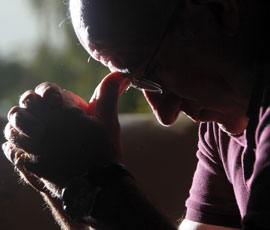How to spot the signs of mental health issues

The run-up to Christmas can be hard for farmers. Catherine McBennett of the Northern Ireland-based charity, the Niamh Louise Foundation, shares a few pointers on what to do if you’re worried about a friend or relative.
Isolation can be a year-round problem for farmers – but winter weather can bring additional hardships that impact on their emotional and mental well-being.
The agricultural community has a largely ‘macho’ culture and mindset. The need to “be the man of the house” and “keep the farm going at all costs” can have a serious impact on the mental well-being of farmers and their families.
A huge pressure can weigh down on farmers’ shoulders – they don’t want to be the one who loses the farm. They think to themselves: “my father could cope, as did generations before him.”
Symptoms to watch out for that last for more than two weeks
- Unusually sad mood that is persistent
- Loss of enjoyment/interest/motivation in things you used to enjoy
- Tiredness
- Lack of energy
- Loss of confidence
- Difficulty concentrating
- Agitation
- Trouble sleeping
- Sleeping too much
- Change in eating pattern
- Feeling tearful
- Lack of enjoyment in life
- Unexplained aches and pains
- Experiencing thoughts of self harm/suicide
- If you do notice these symptoms in yourself or a loved one, it is important to contact your GP, as only they can make a professional diagnosis.
But this perception that previous generations managed alone is detrimental to emotional well-being. Life is different today. We live in an age of technology, a fast-moving society where the fast wheels of the production line and the food industry dictate the workload, demanding higher turnover, higher accountability and more traceability than ever before.
Alongside these economic pressures, the trend for farmers to get bigger and cut costs creates a vicious circle. They become more isolated due to their workload, and less inclined to seek outside help. In turn, the farm becomes their life and they can become the sole worker, as a result of which they forget – or simply don’t have time – to look after their own physical or emotional health.
Farmers are also so used to working on their own that to share their fears and worries can often be seen as being disloyal to the family name or a betrayal of family trust and confidentiality. Sadly, there are instances where more than one suicide has taken place within one family.
The Niamh Louise Foundation sees such issues among the rural communities of Northern Ireland, but they are relevant across the UK. We’ve recently employed a suicide prevention officer, partially funded by the Department of Agriculture and Rural Development, to be available on a one-to-one bases for anyone in distress. We hope it will help people ‘break the silence’ and find the help and support they need.
“Early intervention is prevention” and if farmers are equipped with the correct knowledge and support they can act as gatekeepers to their own mental health. Spotting the signs and symptoms of distress in colleagues, family, and friends is vital.
More information
www.niamhlouisefoundation.comFarming Community Network (FCN)
0845 367 9990
www.fcn.org.uk
RABI
0300 3037373 www.rabi.org.uk
Samaritans
08457 90 90 90 www.samaritans.org

